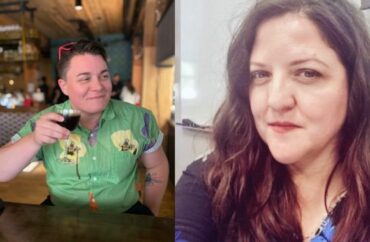
Professors say ‘queer approaches’ ‘tend to focus more heavily on the L and G of LGBTQIA+ and less on some of the other letters’
Two Illinois professors are hoping to stop the “erasure” of bisexuality through the use of “digital spaces.”
Assistant Professor of Critical Feminist Science & Technology Cindy Tekobbe (pictured, right) at the University of Illinois-Chicago is teaming up with Illinois State University Associate Professor of Digital Rhetorics and Technical Communication Derek/Erika Sparby for the symposium. Sparby (pictured, left) goes by “Derek” now but has previously used the name “Erika.”
“Over the last few decades, the fields of rhetoric and writing studies have undergone a sort of queering” and “scholars have come to recognize the value of queer rhetorical approaches,” the pair wrote.
But this has not occurred without issue, according to the two “bisexual scholars” who are organizing the “Symposium Issue of Rhetoric Review on Bisexual Digital Rhetorics.”
“Cindy and Derek have come to recognize that the invisibility that is often socially inherent to bisexuality is often also reiterated in some of these queer approaches,” they wrote.
The “queer approaches…tend to focus more heavily on the L and G of LGBTQIA+ and less on some of the other letters, or on ‘queer’ as a larger umbrella,” they wrote.
“To be clear, this is not a critique of these important works in our field, but merely a recognition that it’s time for bisexual rhetorics to emerge from erasure to visibility,” according to the scholars.
Bisexuality, the professors explain, “does not fit neatly into a gender binary attraction model.”
Instead, they write:
Bisexual people can be attracted to men or women (trans or cis), nonbinary, genderqueer, or any other gender. We can be attracted to one person at a time, or many people. We may be more romantically attracted to some people or more sexually attracted to others. Bisexuality is messy and resists easy classification, and as a result so do our rhetorics.
“Our goal is to elevate the voices of bisexual and queer scholars while increasing the visibility of bisexual rhetorics,” the scholars said.
They hope to “attract a diverse and intersectional group of authors who can begin to assemble a messy puzzle of what it means to be bisexual in digital spaces, to be an individual whose very existence results in the dissolution of binaries and resists neat categorization.”
“What does it mean to build a bisexual community? What does it mean to be bisexual and [___] (and poly, and ace, and trans, and and and)? What does it mean to create a community where bisexuality is not always under scrutiny or erasure,” they ask.
“These are just some of the questions we…hope articles will answer.”
MORE: Minnesota university ends 30% of degrees, cuts staff
IMAGES: EMSparby.com; Cindy Tekobbe/X
Like The College Fix on Facebook / Follow us on Twitter







Please join the conversation about our stories on Facebook, Twitter, Instagram, Reddit, MeWe, Rumble, Gab, Minds and Gettr.